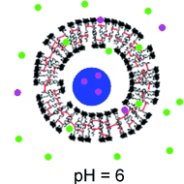
Research at the University of Sheffield demonstrates a new strategy for controlling the permeability of the walls of tiny polymer capsules or polymersomes. Switching the rate at which the polymersomes take up or release their contents means that the new systems could find application as synthetic bio-nanoreactors.
A team of researchers from Dresden, led by Prof Dr Brigitte Voit, and Sheffield, led by Prof Beppe Battaglia, showed how to make polymersomes with cross-linked, pH-responsive membranes. Cross-links are known to toughen membranes, and the team observed a novel response to pH change. Non-cross-linked analogues would completely fall apart as the polymer chains unfold and dissolve in acid; cross-linking holds the polymersome form together. But the membranes still tend to unfold and hydrate, causing the polymersomes to expand and become much more permeable than before.
The team went on to demonstrate that globular proteins can be encapsulated and their rate of reaction controlled by the polymersomes’ permeability. Potential applications of this science include further exploration of the origins of life, synthetic biology and new ways to carry out chemical reactions.







